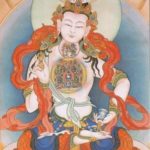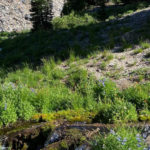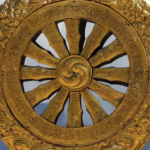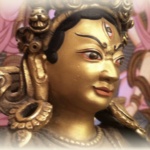Loss and Change
Dear Friends, 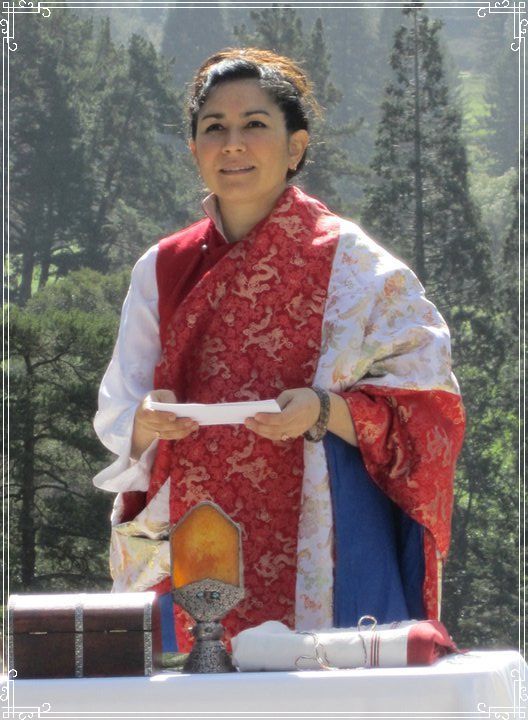
A year ago today, we officially went into lockdown. I met with the board of directors and we realized that our carefully laid plans had been washed away like a sand mandala. I remember looking at my phone on the news and every story was about the coronavirus. As I talked with students and friends, the big fears were the deaths which by now in the U.S. are more than 594,000. Every one of these people had a name and wanted to be happy.
There were other fearsome things that the pandemic brought. The looming threat of the death of our relatives and loved ones, but also the radical, abrupt and shocking change to everyday life. We were haunted by the unknowns. There was economic uncertainty and lost jobs, the restrictions and stay-at-home orders, the loneliness, anxiety and mental health crisis that swept our communities. And also the strange situation of not being able to plan everything. The bizarre effects of not seeing people’s faces, now hidden behind masks and those nightmares of being in a room where someone wasn’t wearing a mask that so many people recounted to me. For us at Ngakpa International the impact was severe, we had purchased our retreat center at the worst time, though we never could have predicted that group gatherings would no longer be allowed. And although we have hung on over the past year, I heard of the permanent closure of one dharma center after another. The world of dharma is permanently changed. Our community too was affected in so many ways and the effects continue, it has required intensive management on the behalf of myself and our leaders to adjust to the new normal.
Through all this, one thing that stood out for me was how accommodating Buddhist teachings are to this situation – the message to urgently integrate awareness of impermanence, the admonishments to face the reality of death and what it means for our daily lives, the clarion call to live a life of love that reduces suffering… The teachings were already there so when the situation arose, there was this sense for me of having a container to hold it in. I remembered that one of the determining factors of post-traumatic stress is whether we have a world-view that can accommodate the stressor. And here we were, sitting together in a worldview primed to promote resilience and acceptance in the face of radical change. I am grateful for that.
There is of course an esoteric Buddhist teaching about exactly this phenomena, the occurrence of rupture, the procession of radical changes that make up a life. That is of course the bardo teaching. Bardo refers to liminality, states in between, times in which we are not what we were nor what we will be. In Dzogchen the bardo teachings are given as a description of the nature of transition and how to move through transition without fear and without suffering. Each bardo is imperative to the next phase, because how we are in the uncertainty defines how we will be when the stability arises again.
It is now possible to imagine that one day in the not too distant future that society will resume again, but the person who we are amidst that new beginning will not be who we once were, at least not at first. It’s the nature of the bardo, it exposes our lack of concrete existence, how readily we can lose what we were, how much that loss defines our life. But of course, after a time we could forget and fall once again under the momentum of those compelling karmic patterns that governed our lives before, falling under the sway of that not-knowing which is so apparent now. And this is why recognizing what can be seen within the bardo is so important. It is an opportunity, albeit at times a harshly delivered one. It is an opportunity to break the chains of our conditioning and wake up more free. The potential is to let change cleanse us of our pettier obsessions and toxic patterns, to let rupture point us towards what is most important so we can live a life in integrity with our authentic nature.
We started some bardo teachings online last summer, but we had such a short time we focused almost entirely on the moment of death. So I am looking forward to expanding, to zoom out into the panorama of what a life is – to expand our view through the teaching on the six bardos.
I hope you will join us for this program. We have two extraordinary guests who will join us for the bardo series. One is Chagdud Khadro who is a specialist in Phowa, the transference of consciousness practice done at the time of death. She is also from a ngakpa lineage, of Buddhist Yogis, so it will be inspiring to connect further with our tradition. And I am also overjoyed, completely overjoyed, to be hosting Shugen Roshi as well, I have been looking forward to having you meet him. I taught with him at the Lion’s Roar retreat and this past winter I was a guest teacher at his community, the Zen Mountain Monastery. I find Zen Buddhism so compelling but also his delivery of it is so grounded and deep. I know you will enjoy him.
If you have a loved one who has passed away in the last year, during the Bardo teachings this weekend we will also practice Zhitro together, the practice for guiding loved ones through the post-death state. You will have an opportunity to learn the practice and we will all perform the practice together. It’s a treasure teaching from Karma Chagme and Mingyur Dorje, quite simple, yet so heartfelt and potent. I have found that it is as much a practice for us as it is for the deceased because it soothes and directs our mind to be of benefit during times of great loss.
Finally, I want to thank you. It has been so touching to be together, to sit together, to talk together, to study together throughout the whole year. In the midst of all the uncertainty our collaboration and service brought us together. I am so grateful for everyone who stepped up to make this possible.
I also feel so much respect for the deep practice we have seen in this period. We have a group of Meditation Instructors who graduated, and another group who are graduating soon. We also have a group who are using the pandemic to finish ngondro. They are currently finishing Vajrasattva accumulations which so auspiciously coincides with Chotrul Duchen, when the Buddha performed fifteen days of miracles, a time of year when Vajrasattva practice is most auspiciously done.
So many sangha also completed the 100 days of practice this year and for the first time we had a space to do this simultaneously online. I invite those of you who did complete the 100 days to share up about this in the upcoming classes, to talk about what that experience was like. Just message me in the direct message if you would be willing to share.
May our health be strong and may we find peace through all our loss and change to come.
Yours always,
![]()
The Bardo Teachings
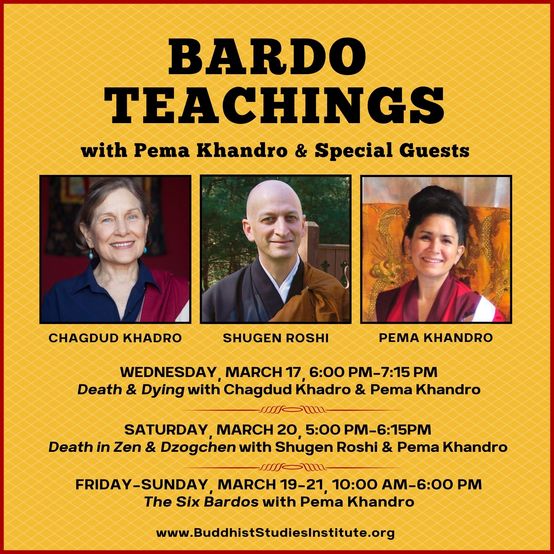
Mar 17, 6-7:15pm
Death & Dying with Chagdud Khadro & Pema Khandro
By Donation. A free event open to the public.
Mar 20, 5-6:15pm
Death in Zen & Dzogchen with Shugen Roshi & Pema Khandro
By Donation. A free event open to the public.
Mar 19-21, 10am-6pm
The Six Bardos with Pema Khandro
Pema Khandro will give a weekend teaching on the Six Bardos, Buddhist instructions for how to live wakefully in the phases of change within our lives.
Online Dzogchen Retreat
This retreat focuses on the paradox of resting in buddha-nature and recognizing illusions. It offers support for exploring Buddhist philosophy experientially through alternating dharma study and practice. The retreat is lead by Buddhist scholar and teacher, Pema Khandro, founder of the Buddhist Studies Institute. As a special event during the pandemic, Pema Khandro will lead the study of and practice of the sems nyid ngal gso, Longchenpa’s instructions on Finding Comfort and Ease in the Nature of Mind, a classic text of the Nyingma lineage of Tibetan Buddhism. This retreat is led entirely online, with alternating sessions of group practice, small group discussions, yoga, meditation, lectures, question and answer sessions with Pema Khandro and private meetings at the end.
ONLINE OPEN TEACHINGS
*All times are listed in Pacific Time UTC-8 (Timezone Converter)
Daily Meditation – Online
Join our certified meditation instructors for a short free daily practice online. Each day meditation is followed by a brief discussion on Buddhist ethics.
Thursdays – Through April, 8am
A Course in Valid Cognition with Geshe Sonam
Winter Pramana Study, Join Any Time
MEMBERS-ONLY CLASSES
3rd Wednesdays – Ngakpa Training with Pema Khandro
